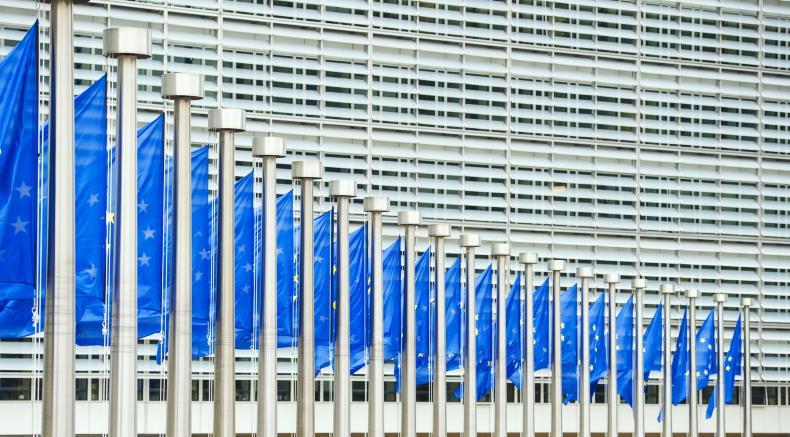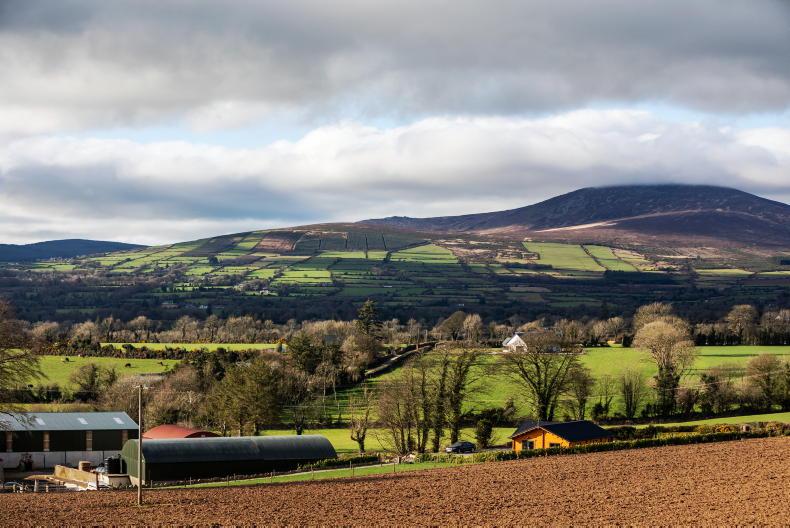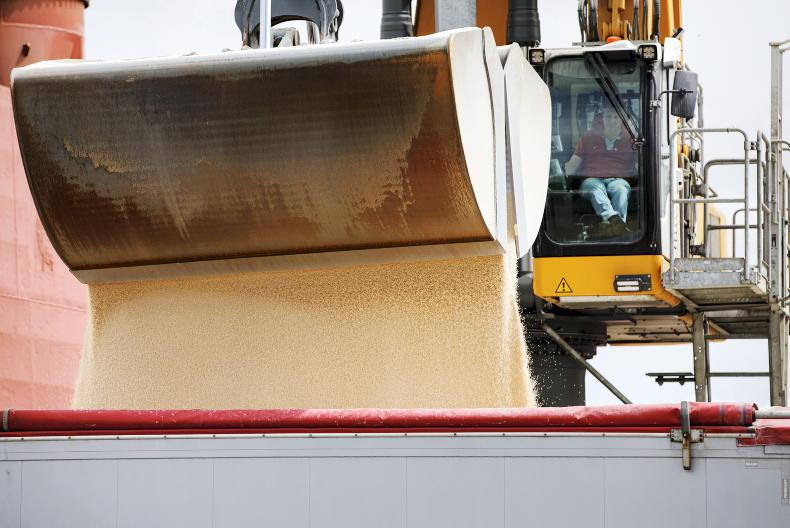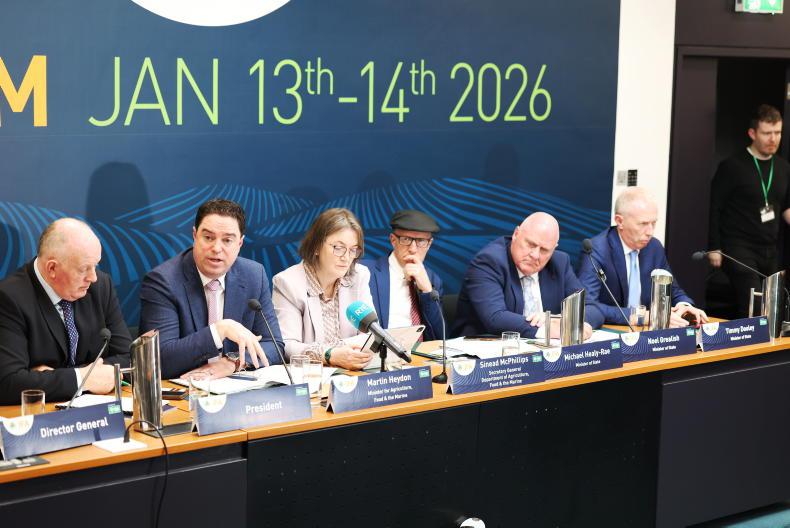The European Commission has put more money and greater flexibilities on the table when it comes to Irish rewetting.
In leaked documents seen by the Irish Farmers Journal, the Commission said it will assess any gaps between member states’ nature restoration funding needs from the EU budget and identify solutions to bridge them.
Crucially, policymakers in Brussels have said that no farmer should have to pay for rewetting or nature restoration and that there will be additional funding made available if required. While this funding will come via aspects of CAP, there will also be resources drawn from EU funds outside the CAP budget.

Ireland could be allowed to use more former peat extraction sites and state-owned land for rewetting.
The Commission has also committed to considering “further flexibility” for countries, such as Ireland, which have a higher percentage of drained peatlands in agricultural use. It suggested that Ireland could be allowed to use more former peat extraction sites and State-owned land for rewetting, rather than farm land.
The commitments from Brussels go some way towards recognising calls for new funding for nature restoration and warnings around the impact it will have on farmers and food production.
Costs
No farmer should have to pay for rewetting or nature restoration, the Commission insisted.
“To the contrary, those who will contribute to reaching the targets should not only be compensated, but be rewarded for the high value of the ecosystem services they will provide,” it said.
The Commission said it “fully recognises the importance of involving farmers and landowners and making rewetting economically attractive for them, including through financial support”.
It said that the high value of the ecosystem services provided by farmers must be recognised, through new business models and income possibilities such as carbon farming.
Budget
Funding needs for EU nature restoration have been estimated at €6bn to €8bn per year and the Commission suggested that there are “several opportunities” available at the EU level to meet this.
Ignoring calls that nature restoration should be fully funded from outside the CAP, the Commission drew “particular” attention to the CAP budget 2023-2027, at €387bn, and how it might contribute to the funds required.

The European Commission has outlined where funding for rewetting might come from, outside of the CAP. \ Clive Wasson
As one of the CAP’s nine specific objectives, the Commission highlighted that the €387bn must “contribute to the protection of biodiversity, enhance ecosystem services and preserve habitats and landscapes”.
“The CAP should, therefore, work in synergy with restoration efforts,” it said.
Other funding streams
However, the Commission also listed the Programme for the Environment and Climate Action (LIFE), the European Regional Development Fund, the Cohesion Fund, the Just Transition Fund, Horizon Europe and InvestEU as other funding avenues to support nature restoration.
“The Recovery and Resilience Facility is a further source of funding for the protection and restoration of biodiversity and ecosystems,” it said.
The Commission also said there is “significant potential for leveraging private and public/private investments” for nature restoration and committed to do more to explore these.
Carbon farming
New tools and business models to provide additional income opportunities for capturing carbon and improving biodiversity to land owners and managers were also committed to by the Commission.
It said a key initiative here is the Carbon Removal Certification proposal that is currently being negotiated by the co-legislators and which is expected to be finalised in early 2024.

Funding needs for EU nature restoration have been estimated at €6bn to €8bn per year.
Overall, while not committing concrete new funding for rewetting, the Commission said it will work to bridge the gaps, no farmer will pay and that biodiversity funding resources will be streamlined at an EU level.
Analysis
The Commission also said it will soon make available additional information and data on the potential impact of rewetting, in particular on the link between nature restoration and food security.
This somewhat answers the call from farm organisations and rural politicians for an impact assessment of nature restoration plans, something that has thus far been lacking.
However, prior to this data being published, the Commission argued that nature restoration will “lead to strong economic benefits”, claiming every €1 invested will create at least €8 of an additional economic boost.
Read more
Nature restoration should be funded outside CAP – Minister Ryan
2,000ha Glenasmole Valley to be rewet and planted with trees
Rewetting targets cut in the face of pushback
EU nature restoration law now at ‘critical juncture’ - McGuinness
The European Commission has put more money and greater flexibilities on the table when it comes to Irish rewetting.
In leaked documents seen by the Irish Farmers Journal, the Commission said it will assess any gaps between member states’ nature restoration funding needs from the EU budget and identify solutions to bridge them.
Crucially, policymakers in Brussels have said that no farmer should have to pay for rewetting or nature restoration and that there will be additional funding made available if required. While this funding will come via aspects of CAP, there will also be resources drawn from EU funds outside the CAP budget.

Ireland could be allowed to use more former peat extraction sites and state-owned land for rewetting.
The Commission has also committed to considering “further flexibility” for countries, such as Ireland, which have a higher percentage of drained peatlands in agricultural use. It suggested that Ireland could be allowed to use more former peat extraction sites and State-owned land for rewetting, rather than farm land.
The commitments from Brussels go some way towards recognising calls for new funding for nature restoration and warnings around the impact it will have on farmers and food production.
Costs
No farmer should have to pay for rewetting or nature restoration, the Commission insisted.
“To the contrary, those who will contribute to reaching the targets should not only be compensated, but be rewarded for the high value of the ecosystem services they will provide,” it said.
The Commission said it “fully recognises the importance of involving farmers and landowners and making rewetting economically attractive for them, including through financial support”.
It said that the high value of the ecosystem services provided by farmers must be recognised, through new business models and income possibilities such as carbon farming.
Budget
Funding needs for EU nature restoration have been estimated at €6bn to €8bn per year and the Commission suggested that there are “several opportunities” available at the EU level to meet this.
Ignoring calls that nature restoration should be fully funded from outside the CAP, the Commission drew “particular” attention to the CAP budget 2023-2027, at €387bn, and how it might contribute to the funds required.

The European Commission has outlined where funding for rewetting might come from, outside of the CAP. \ Clive Wasson
As one of the CAP’s nine specific objectives, the Commission highlighted that the €387bn must “contribute to the protection of biodiversity, enhance ecosystem services and preserve habitats and landscapes”.
“The CAP should, therefore, work in synergy with restoration efforts,” it said.
Other funding streams
However, the Commission also listed the Programme for the Environment and Climate Action (LIFE), the European Regional Development Fund, the Cohesion Fund, the Just Transition Fund, Horizon Europe and InvestEU as other funding avenues to support nature restoration.
“The Recovery and Resilience Facility is a further source of funding for the protection and restoration of biodiversity and ecosystems,” it said.
The Commission also said there is “significant potential for leveraging private and public/private investments” for nature restoration and committed to do more to explore these.
Carbon farming
New tools and business models to provide additional income opportunities for capturing carbon and improving biodiversity to land owners and managers were also committed to by the Commission.
It said a key initiative here is the Carbon Removal Certification proposal that is currently being negotiated by the co-legislators and which is expected to be finalised in early 2024.

Funding needs for EU nature restoration have been estimated at €6bn to €8bn per year.
Overall, while not committing concrete new funding for rewetting, the Commission said it will work to bridge the gaps, no farmer will pay and that biodiversity funding resources will be streamlined at an EU level.
Analysis
The Commission also said it will soon make available additional information and data on the potential impact of rewetting, in particular on the link between nature restoration and food security.
This somewhat answers the call from farm organisations and rural politicians for an impact assessment of nature restoration plans, something that has thus far been lacking.
However, prior to this data being published, the Commission argued that nature restoration will “lead to strong economic benefits”, claiming every €1 invested will create at least €8 of an additional economic boost.
Read more
Nature restoration should be funded outside CAP – Minister Ryan
2,000ha Glenasmole Valley to be rewet and planted with trees
Rewetting targets cut in the face of pushback
EU nature restoration law now at ‘critical juncture’ - McGuinness













SHARING OPTIONS